‘I Retired, And Earned Rs 35 Lakh/Year Thanks to my Innovative Fruit & Cacao Farm’
A journey through Chempotty Estate, a vast organic farm in Mysuru, through the eyes of Thankachan Chempotty, a retired corporate official who grows many varieties of fruits, vegetables, spices, and sells them as value-added products to earn lakhs.
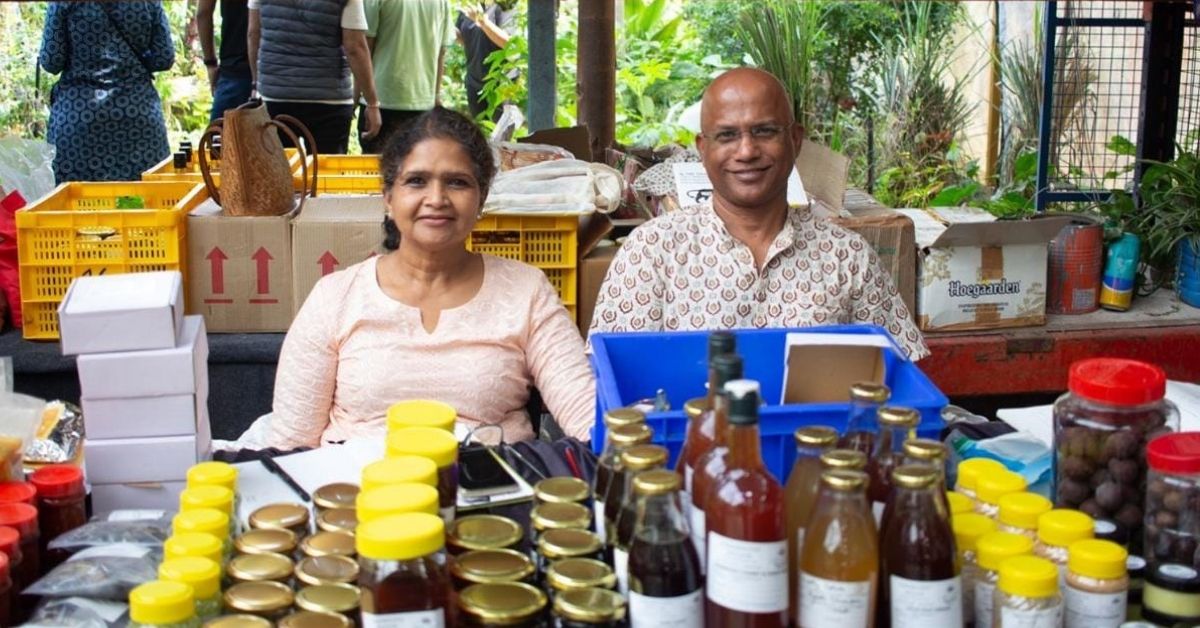
For Thankachan Chempotty, farming has been a part of his life since he was a young boy. Hailing from Thekkumkutty in Kozhikode, Kerala, he nurtured his love for agriculture even while he was working for several corporations for decades.
“I grew up in an agricultural family, and come from a generation that used to walk to schools for kilometres every day, and work on the fields after school hours,” he recalls in conversation with The Better India. “I had a tough life growing up and I think farming has really helped me throughout, giving me the stamina and vision to move ahead in life.”
Thankachan, who juggles organic farming while working as a consultant for several FMCG companies, owns a flourishing organic farm on 22 acres of land in Nanjangud.
Named Chempotty Estate, the farm is his favourite place, the 58-year-old says, adding that his wife, Jessy is as involved in the farming as he is. “We grow coconut, arecanut, nutmeg, cacao, and several other fruit trees. I have around 17,000 trees and plants on my estate,” he says.
“We also make several value-added products out of the organic produce, with an aim to reduce wastage and increase the market value of the produce,” he adds.
Today, he makes a total revenue of about Rs 35 lakh a year from his organic farm.
Turning a chemical laden land into organic farm
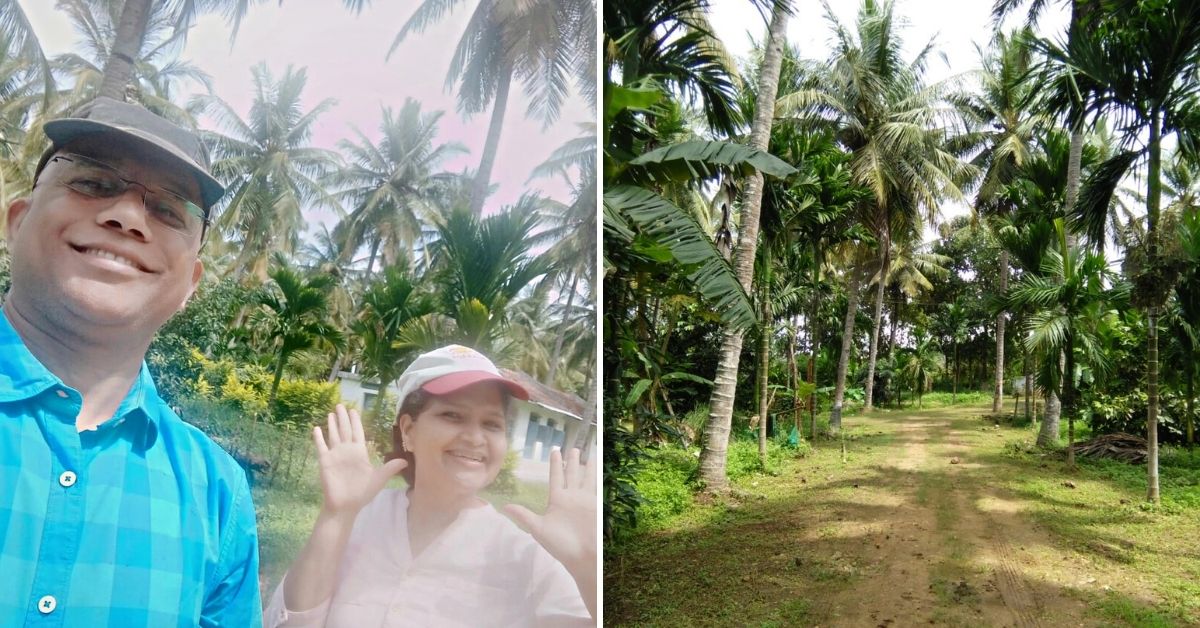
When Thankachan decided to do organic farming in 2005, he was confident he could transform the 22 acres of land from a chemical-laden farm to an organic one. “Before us, the land was used for cultivating crops like vanilla, coconut, chikku etc, where they used several chemicals and pesticides. But I was sure that I could transform it into an organic farm if I put in enough effort and patience,” he explains.
It took him around four to five years to achieve his goal. “I used Subhash Palekar’s natural farming method of using jeevamrut, a concoction made out of cow urine, dung, and other natural ingredients. This helped a lot in improving the soil quality. I also planted around 450 moringa trees and around 500 neem trees, which in turn helped in increasing the fertility,” he explains.
When the land was ready, Thankachan decided to grow different cash crops, adopting a four layer method. “I have coconut trees on the first layer, the second layer is for the arecanut trees, and the third layer for cacao and other fruit trees like guava, mangoes etc. On the fourth layer, we have planted ginger, turmeric, tapioca, sweet potatoes and so on,” he says.
“Currently, we have around a thousand coconut trees that are over 30 years old, around 4,000 areca-nut trees that are around six years old, and 3,500 cacao plants that are around 8 years old.”
Other than that, the farm also grows fruit trees like cherries, passion fruit, jackfruit, soursop and much more.
A love affair with cacao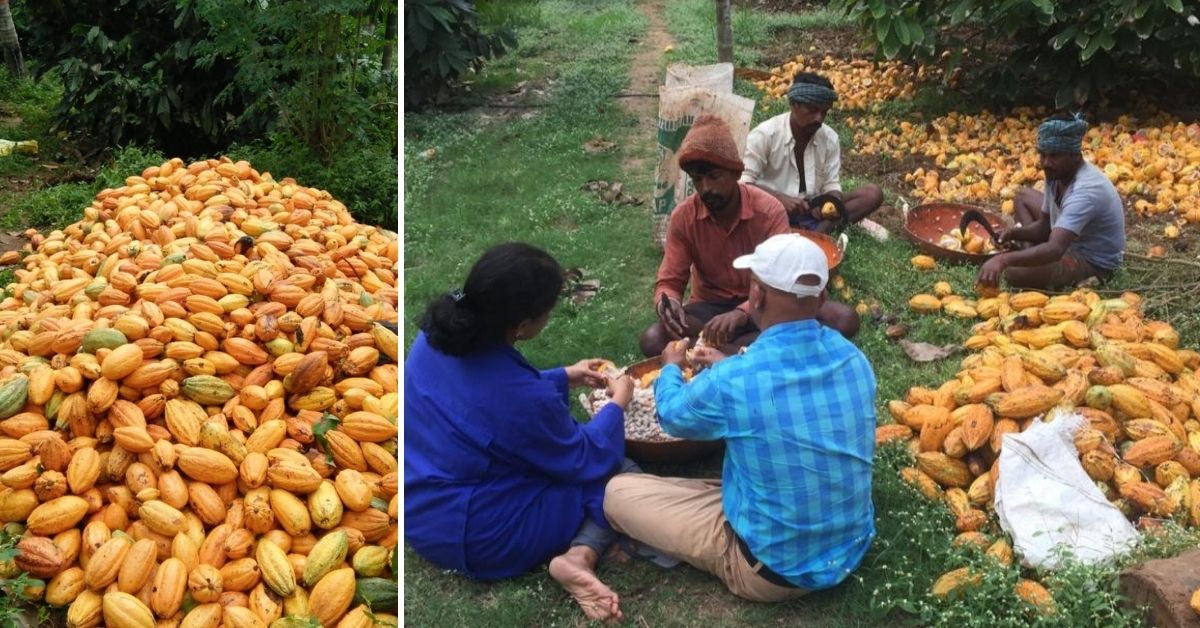
According to Thankachan, while arecanut and coconut both pay well, it is his cacao plants that he finds most interesting. “It is a crop that you can leverage a lot more,” he opines.
“Usually people sell raw cacao seeds for Rs 45-60 per kg. But if you can do the fermentation processing, the harvest is around four to five times more profitable than selling them as seeds,” he says, emphasising that he always sells cacao in its fermented or dried form.
The organic produce from the Chempotty Estate is often made into several-value added products, thereby leveraging more revenue and reducing wastage. Thankachan says, “The creative mind behind it is my wife Jessy.”
Jessy, who was working as a teacher for over three decades, quit her full-time job in 2020 to focus more on their farm. “I never liked wasting anything that grows on our farm. So, I try my best to come up with ideas to make value-added products out of everything,” she says.
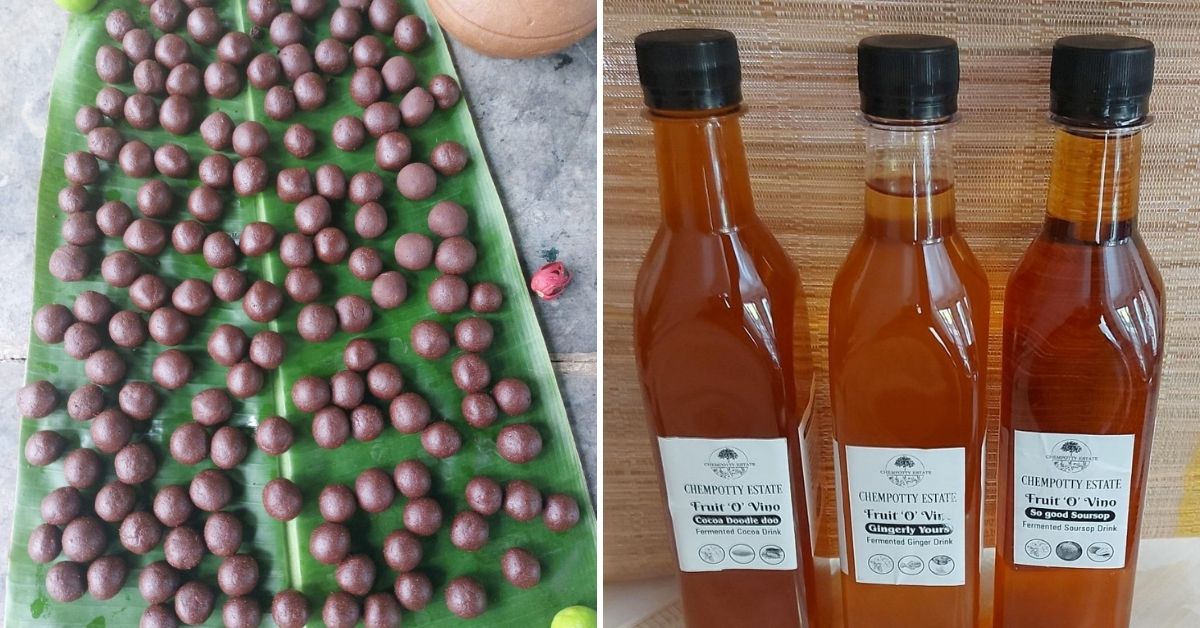
She also notes that often, only cacao beans are used, and the residue of the fruit is wasted as run-off. “I wanted to do something by using the juice rather than wasting it. It was tasty, but had a very short shelf life. I experimented with it and made a cacao syrup, or a dip. It is sweet, with slightly sourish notes. The green chilli powder and salt make it a spicy dip. You can have it as is, drizzle it over bread, chapati, puri, and cakes, add it as a taste enhancer in smoothies and shakes, or use as a seasoning on salads,” says the 56-year-old, adding that it goes with all the veg and non-veg cuisines.
Jessy also found success in making several other products out of cacao like wine, vinegar and even laddus.
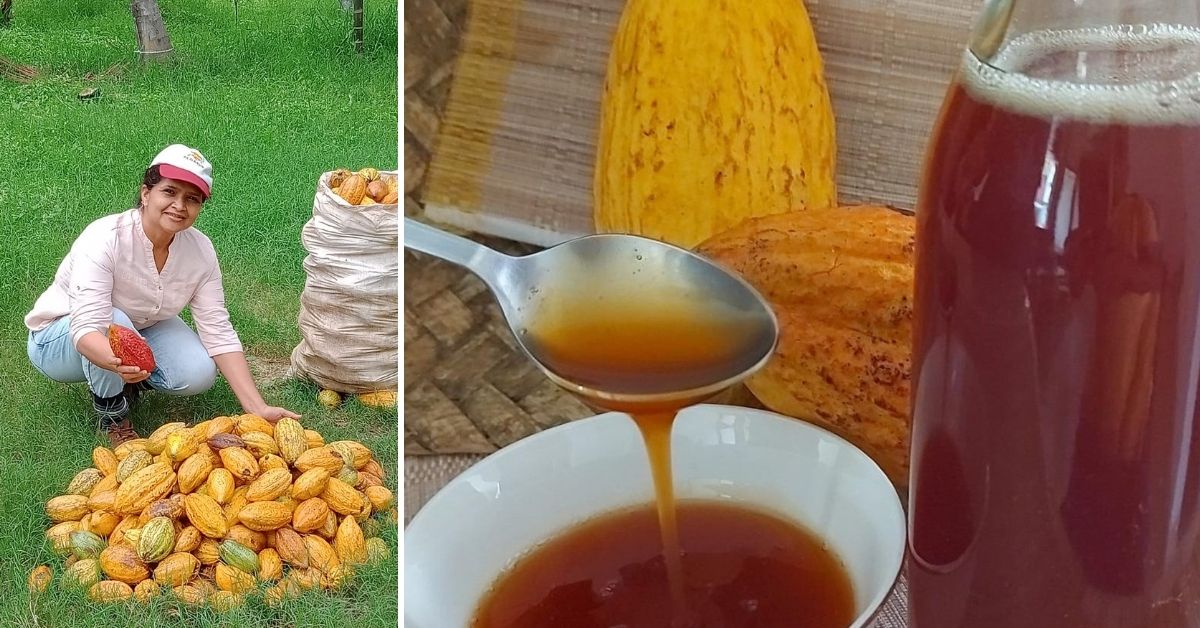
“Through value-added products, we have been able to reach a larger customer base and it has been very profitable. From cacao, we make a revenue of around Rs 10 lakh per year,” adds Thankachan.
“We also make use of other fruits to make juices, wines, jams, marmalades, pickles, chutneys etc,” says Jessy, adding that the wines have been the fastest selling among all the products.
Amitha D’costa, a regular customer of Chempotty Estate says, “We used to buy fruits and vegetables from the market before, but once we started buying it from them, we could make out the difference. They are so fresh and organic, and they taste really good. I have been buying from them every week. I have also bought the cacao laddus and the beans from them, they were too good.”
All products are sold through their website, as well as Farmizen, an online platform for organic products, directly sourced from local farmers. Besides, you can also buy their products directly from their farm.
(Edited by Divya Sethu)
If you found our stories insightful, informative, or even just enjoyable, we invite you to consider making a voluntary payment to support the work we do at The Better India. Your contribution helps us continue producing quality content that educates, inspires, and drives positive change.
Choose one of the payment options below for your contribution-
By paying for the stories you value, you directly contribute to sustaining our efforts focused on making a difference in the world. Together, let’s ensure that impactful stories continue to be told and shared, enriching lives and communities alike.
Thank you for your support. Here are some frequently asked questions you might find helpful to know why you are contributing?


This story made me
-
97
-
121
-
89
-
167











